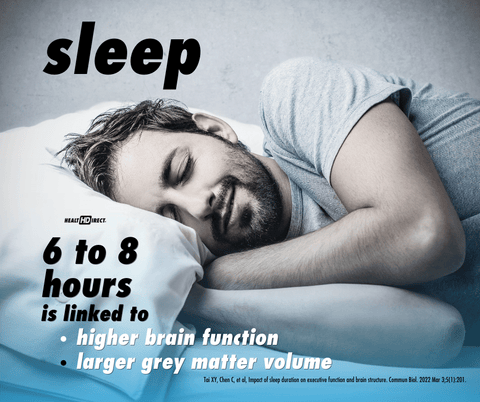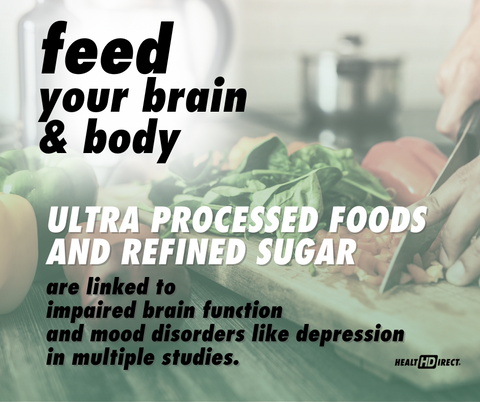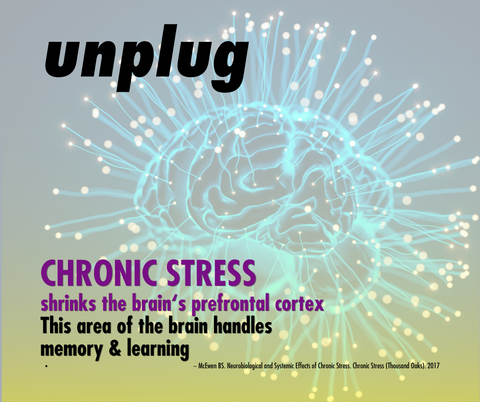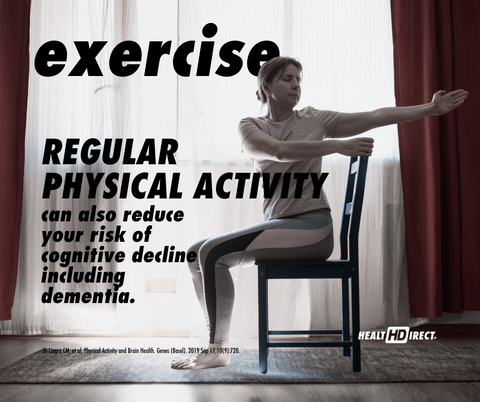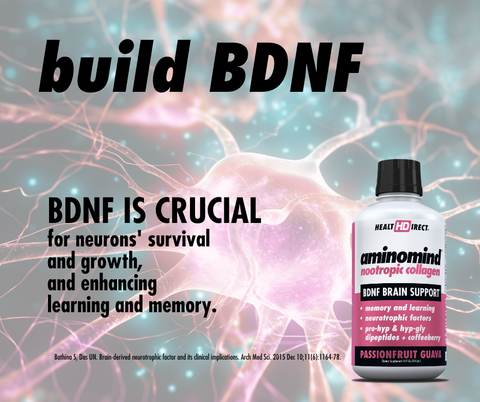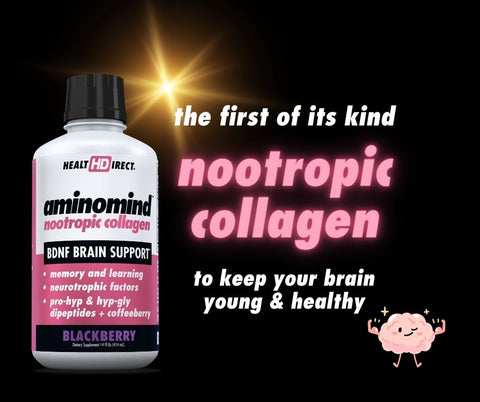Estimated Read Time: 4.5 Minutes
Article Summary
Brain health is crucial for a fulfilling life, and our cognitive abilities tend to decline as we age. However, there are ways to build and maintain your brain, called cognitive enhancement. Cognitive enhancement refers to using external means to improve cognitive functions such as memory, attention, and problem-solving abilities. To keep your brain sharp and your cognitive performance in top condition, here are 5 easy ways to build your brain.
#1. Get Plenty of Sleep
The first easy way to build your brain is to get some rest. Good sleep is essential for our well-being, allowing our body to repair and rejuvenate. Not getting enough sleep can negatively affect our cognitive function, emotions, immune system, and decision-making skills. Prioritizing sufficient sleep for optimal functioning and a healthy lifestyle is important.
Prioritize brain rest.
Prioritizing brain rest is of utmost importance for overall health and brain health. Resting the brain allows it to recharge and restore its functioning, which is critical for optimal cognitive performance and overall well-being. Without adequate rest, the brain can suffer from fatigue, cognitive decline, and decreased productivity.
It is recommended that adults get between 7 to 9 hours of sleep per night, as this allows for the brain to go through essential cycles of deep sleep and REM sleep. Deep sleep helps with memory consolidation and learning, while REM sleep is important for emotional regulation and dreaming. Both types of sleep are crucial for brain health and overall functioning.
Can a catnap help?
Napping can have benefits in addition to a good night's sleep. A short nap of 20-30 minutes can improve alertness, concentration, and mood, as well as enhance memory formation and provide a temporary energy boost. It is important to avoid napping for too long or too late in the day, as this can interfere with nighttime sleep.
Going to bed and waking up at the same time each day helps regulate the body's internal clock and promotes quality sleep. Engaging in activities such as listening to calming music or practicing relaxation techniques can help relax the brain and promote rest.
By allowing the brain to rest properly, we can improve cognitive abilities, mood, and overall well-being.
#2. Eat For Your Mind, Not Just Your Body
The next easy way to build your brain (and body) is to give it good fuel. Maintaining a healthy diet is important for physical and mental well-being. Our food choices can significantly impact our mental health, influencing cognitive functions and mood and reducing the risk of mental health disorders. Essential nutrients are crucial for our minds just as they are for our bodies.
What a brain needs...
Proper nutrition plays a vital role in maintaining brain health. Consuming foods rich in omega-3 fatty acids, vitamins, unsaturated fats, and fiber can greatly benefit our brain function and overall well-being. If your diet isn't what it should be, be sure to take a premium, liquid multivitamin.
Omega-3 fatty acids are crucial for brain health as they help build brain cells and improve their communication. Foods like salmon, tuna, and other fatty fish are excellent sources of omega-3 fatty acids. Nuts and seeds, particularly peanuts, are also rich in these essential fats.
Eating the rainbow ensures you'll get a full spectrum of vitamins.
Vitamins are also essential for optimal brain function. Foods such as broccoli, kale, and spinach are packed with vitamins C, E, and K, which help protect brain cells from damage. Berries, such as blueberries and strawberries, are rich in antioxidants and vitamins that have been shown to improve memory and cognitive function.
Unsaturated fats, like those found in avocados and olive oil, are healthy fats that can help support brain health. They can improve blood flow to the brain and reduce inflammation, thus enhancing cognitive function.
Don't forget fiber!
Fiber is important for maintaining a healthy gut-brain connection. Whole grains, such as brown rice and quinoa, are excellent sources of fiber. They provide a slow and steady release of energy to the brain, improving concentration and focus.
Quick recap: Eat foods rich in omega-3 fatty acids, vitamins, unsaturated fats, and fiber -- it is crucial for proper brain health. Including vegetables like broccoli and kale, peanuts, berries, whole grains, and fish such as salmon and tuna in our diet can help support optimal brain function and overall well-being.
Caffeinate — but not too much...
Caffeine can help your brain. Caffeine is a stimulant that can help boost brain function and improve cognitive performance. It can increase your alertness during the day. Caffeine blocks the neurotransmitter adenosine, which promotes relaxation and sleepiness. By blocking adenosine, caffeine increases alertness and wakefulness, making you feel more focused and attentive.
But caffeine can over-excite your body, give you the jitters, cause headaches, and act as a diuretic. So, being mindful of how much caffeine you consume is important.
Moderate caffeine intake, on the other hand, can provide a temporary energy boost. The polyphenols in coffee are also beneficial. However, the more a coffee bean is roasted, the more it loses its health benefits. Exciting new derivatives from coffeeberries maintain the high polyphenol benefits with just a bit of caffeine.
Brain "diet" foods
Nourishing your brain is essential for optimal cognitive function and overall well-being. Incorporating brain-nourishing foods into your diet can enhance brain health and support various cognitive processes. Here are some top brain-nourishing foods and their benefits:
- Leafy green vegetables like arugula and spinach are rich in folate, a B vitamin that helps improve cognitive function and supports the production of neurotransmitters, the chemical messengers between brain cells. Folate also helps reduce the risk of age-related cognitive decline.
- Fish such as salmon and mackerel are rich in omega-3 fatty acids essential for proper brain function. Omega-3 fatty acids help protect the brain against cognitive decline, boost memory, and alleviate symptoms of depression and anxiety.
- Fermented foods like yogurt contain probiotics that contribute to a healthy gut microbiome. The more we learn about the gut-brain connection, the more we realize that a healthy gut contributes to a healthy brain. Probiotics have been shown to improve mood, reduce anxiety and stress, and enhance cognitive function.
- Nuts and seeds like almonds, flax, and chia are packed with brain-boosting nutrients such as vitamin E, antioxidants, and omega-3 fatty acids. These nutrients support brain health, reduce inflammation, and improve memory and cognitive function.
The perks of a "brain friendly diet."
Dark chocolate, particularly those with a high cocoa content, contains serotonin, a neurotransmitter that promotes feelings of well-being and happiness. Dark chocolate is also a great source of magnesium, which aids in reducing stress and enhancing memory and learning.
All of these brain-nourishing foods can profoundly affect your brain health and cognitive function. Unfortunately, a lot of our foods have lost their nutritional values (we talked about that in this blog post), so you may want to fortify your brain with a great multivitamin like Health Direct's premium liquid vitamin, Nature's Optimal Nutrition, in a refreshing smooth mango flavor so you get everything your brain craves.
#3. Give Your Brain A Rest
Our brains are on ON all the time these days. Even trying to wind down can be challenging. Meditating can be a great way to give your brain a break. Meditation is a practice that has been embraced by various cultures for centuries and is gaining popularity worldwide due to its numerous benefits for mental, emotional, and physical well-being.
Meditation has been proven to promote relaxation, mental focus, and inner peace.
By redirecting your thoughts and entering a state of heightened awareness, you can detach from everyday stressors and connect with your true self. If you're looking for a great way to learn to slow down your mind, try the smartphone app Headspace. It's a great app for your smartphone, so you can take it anywhere.
Unplug and just breathe to reduce stress.
If things are a bit hectic, and you can grab some devoted time for meditation, try intentionally unplugging for 5 minutes. In our fast-paced and interconnected world, getting caught up in the constant hum of news updates and social media notifications is easy.
However, taking a step back and intentionally unplugging can do wonders to combat mental fatigue. Unplugging means taking a break from the digital world (and TV too.) It's creating some "me time" to simply breathe and rejuvenate. When we unplug, we give ourselves the chance to escape the overwhelming influx of information and stimuli that bombard us and wear us out.
Unplugging on purpose also significantly reduces stress levels. We literally have a lot on our minds. The constant exposure to the news (which is largely negative) and social media (which is a firehose of information) can overload our brain's circuitry and contribute to anxiety and stress.
When we unplug, our brains have time to recharge and refocus our attention on what truly matters. By giving ourselves the space and time to breathe, we can restore balance and find inner calm in an increasingly chaotic world. It's common for us to be shallow breathers as well. Your brain needs fresh oxygen! Here's a quick video that shows you how to breathe deeply.
Flex your mental muscles regularly.
Flexing your mental muscles regularly keeps your brain creating new connections so it stays sharp. This is called neuroplasticity.
There are a myriad of ways to engage your brain, like playing games, reading a variety of books, joining a book club, doing crosswords or Sodoku, focusing for a moment and using all your senses, learning a new skill, trying a new hobby...the list is endless.
- Puzzles, crosswords, and chess challenge your problem-solving and critical-thinking abilities.
- Reading a variety of books exposes your mind to different ideas and perspectives, improving your cognitive flexibility.
- Try activities that require you to mindfully use all of your senses: sight, hearing, touch, taste, and smell. This could include cooking, gardening, or exploring new environments.
- Learn a new skill, such as playing a musical instrument, painting, or something similar, to increase your gray matter, which is responsible for memory and cognitive functions. These hobbies stimulate the brain by creating new neural pathways.
Social interaction builds your brain too.
As you look for ways to build your mental muscles, be sure to include things that involve social interaction. Healthy adults with the mind and memory of someone 20 to 30 years younger have been found to have little social isolation.
Just like the effects of exercise build our mind-to-muscle communication, we build strong neural pathways and create more efficient neural circuitry by engaging our brains. These both help keep your brain young.
Connect with the present moment.
In our fast-paced world, we often find ourselves constantly distracted by thoughts of the past or worries about the future. However, shifting our focus to the present moment can profoundly impact our overall mental stamina and bonus...happiness.
When we are mindful, we become more aware of our thoughts, feelings, and sensations.
Mindfulness helps us to become more self-aware and enables us to respond more skillfully to stressors and obstacles rather than reacting impulsively or being overwhelmed by negative emotions. When we live in a reactive, fight-flight-free space all day, our brains and bodies give out fast. Chronic stress is an underlying cause of physical disease, oxidative stress, and mental overload. It literally produces toxins in our brains and our bodies.
Other benefits of giving your brain a rest.
Building our brains with techniques for unplugging like mindfulness also gives us a greater sense of resilience, control, and adaptability. We become more adept at managing difficult emotions and challenging situations by staying present and aware. It's easier to make clear-headed decisions and approach problems from a calm space that gives us time to think, consider, recall, and then make decisions.
You'll also notice that engaging your mind in the present reduces acute stress, which makes our bodies tense and puts our shoulders near our ears. Increased levels of adrenaline wreak havoc on the brain and body over time.
Taking a moment to "Be Here Now" can have neuroprotective effects on your brain, too.
Minimize all those digital distractions.
In today's technologically connected world, getting caught up in digital distractions can be all too easy. Whether it's social media, emails, or endless notifications from various apps, these distractions can have negative impacts on mental stamina and exhaustion.
Consider some simple strategies, such as setting boundaries, setting times with no screen time, turning off the notifications chime, a short walk without any kind of digital accompaniment, and using productivity tools to increase your efficiency so you aren't worried about what you aren't doing...that nasty FOMO can be hard to set aside.
Like any good tool, it can be useful or dangerous. A good app can help you with improvements in performance or sidetrack your attention. Try to set boundaries for yourself and how you use them. Once you have a good routine, an app will help you focus, lower your stress, and even improve your cognitive speed as you push away the distractions to your attention.
#4. Honor Your Brain In A Heartbeat
Regular exercise has huge benefits for cognitive and physical health. Research has shown that physical exercise stimulates the development of new nerve cells and enhances connections between brain cells, which can contribute to improved cognitive function.
Regular exercise has been shown to decrease the risk of depressive disorders, cognitive decline, and even dementia. Physical activities such as jogging, swimming, or weightlifting increase blood flow and oxygen delivery to the brain. Any kind of exercise that requires cross-pattern movements is especially good. Any surge of oxygen and nutrients fuels the growth of new nerve cells, promotes brain health, and prevents cognitive decline. Short bursts of high-intensity exercise are especially beneficial to your body and brain.
Doing some moderate exercise also has neuroprotective effects; while over-exercise can create inflammation, moderate exercise helps lower it in part by pumping the lymphatic system. If we keep our bodies moving, learn new skills, and challenge our thinking patterns, our brains can constantly adapt and create connections.
Why exercise helps build your brain.
Exercise spurs the development of new nerve cells and enhances connections between brain cells, improving the brain's organization. This also ensures your brain and body don't shrink. Just as we lose body mass with age, we also "use it or lose it" with brain volume. Connectivity is the secret of a fit and healthy brain. But if we do the same things the same way over and over, our brains create pathways of least resistance. Or if we stop moving as we get older, those pathways eventually wither.
Challenging your mind-body connections by doing old things in new ways keeps your brain healthy.
Understanding the interrelationships of regular exercise, cognitive decline, lowering the risk of dementia, continually creating new nerve cell connections, creating new brain cells at any age, improving heart health and blood pumping, increasing oxygen flow, reducing neuroinflammation, lowering blood pressure, and challenging your brain by challenging your body all lead to the last element of keeping your brain healthy: BDNF.
#5. Build Your BDNF Levels
After the pandemic, we learned a lot about how our natural responses to stress and our capacity for resilience manifest in our brains. Brain-derived neurotrophic factor (BDNF) plays a crucial role in the brain by promoting neuron growth, survival, and differentiation.
Some call BDNF "Miracle-Gro for the brain" because it supports the development of new neurons and synapses. However, as we age, serum levels of BDNF naturally decrease. Lowered BDNF contributes to the shrinkage of gray matter and decreased synaptic connections. This is part of the reason it becomes harder to learn new information, form memories, and remember/recall them.
Additionally, low levels of BDNF are associated with depression and anxiety, which suggests a potential connection between mental health and this vital neurotrophic factor. In fact, the latest research has revealed that antidepressants may work by increasing levels of BDNF in the brain. By boosting BDNF expression, it's possible these medications are reversing the shrinkage of the brain's hippocampus region. Shrinkage in this brain region is often seen in individuals with depression.
Even more reasons BDNF levels make a huge difference.
BDNF is highly responsive to stress and plays a key part in helping to improve our moods. Counterintuitively, BDNF can also work with environmental factors and adverse events to strengthen feelings of anxiety, fear, and depression.
Everything we do or encounter encourages the brain to work quickly and efficiently as a survival mechanism in today's rapidly changing world. BDNF is at the heart of our brain's ability to adapt and change. Increasing BDNF enables our brains to structurally and functionally adapt to these changes. We can combat memory loss, promote in-the-moment recall of memories, ensure fast reflexes, and facilitate our ability to learn/retain information throughout our lives.
How does all that work? BDNF is involved in signaling stem cells that they should differentiate themselves into brain neurons; it stimulates and controls neurogenesis. BDNF works with other cofactors in our cells to encourage the growth and survival of neurons both in the brain and the peripheral nervous system.
What are the benefits of high BDNF levels?
- BDNF increases brain plasticity. When your brain cells get damaged or face a stressful situation, BDNF protects them and helps them come back stronger.
- BDNF eases depression. Your neural pathways become more flexible instead of shutting down, which could explain why higher levels of BDNF are associated with warding off depression.
- BDNF boosts weight loss. Studies show that the more overweight a person is, the lower their BDNF levels is. In a study of Japanese children, researchers found that low levels of BDNF during gestation made them more prone to low BDNF levels and at risk for obesity in childhood.
- BDNF improves sleep. BDNF can help you get a better night's sleep by increasing your slow brain waves during your deepest stage of sleep.
- BDNF protects against neurodegenerative disease. Researchers believe that high BDNF may lower your risk of developing neurodegenerative disorders such as Alzheimer's and Parkinson's. One study tracked a group of adults for ten years and found that those with the highest levels of BDNF had a 50% less chance of developing dementia or Alzheimer's than those with the lowest levels.
The aging brain typically sees BDNF start to fall. There are ways to help your brain be resilient and prime it to grow stronger. Coffeeberry extract is one way to increase BDNF levels. Intermittent fasting also increases BDNF.
Polyphenols help increase BDNF levels.
Neutralizing the substances that damage brain tissues can be a challenge. Our brains are protected by a protective sheath called the blood-brain. It doesn't allow much to cross into your brain's skull casing. Antioxidants are a way to prevent free radicals from damaging your brain cells. Antioxidants also stimulate BDNF to protect your brain from stress. Coffee, coffeeberries, green tea, dark chocolate, blueberries, and colorful vegetables are all excellent polyphenol sources.
How to increase your BDNF levels.
It would be great if BDNF came in a pill...it doesn't.
BDNF is produced all over your body, muscles, and digestive tract. Even though your body makes BDNF, it can't reach the brain. BDNF is a large molecule that can't cross the blood-brain barrier. It also has a short half-life. However, your brain cells can make BDNF if they have the right resource materials that can cross the blood-brain barrier.
Coffeeberry extract raises BDNF by about 140 percent within 60 minutes, and that increase is sustained for a few hours! This is why everyone is so excited by Coffeecherry Extract. It's also why Health Direct created AminoMind, a unique formula with a fractionated version of coffeecherry extract that has been shown in gold-standard, double-blind, placebo-controlled, randomized studies to improve cognitive health.
Help your brain make BDNF with nootropic liquid collagen
The fractionated version of whole fruit coffee extract a.k.a. coffee cherry extract used by Health Direct provides the perfect nutrient resources your brain needs to make BDNF and quickly restore your BDNF levels to help your brain function like it did years ago. You also get the benefits of nootropic collagen to sustain and improve your brain mass, so you have plenty of brain "filing cabinet" space to keep making memories and the circuitry to quickly recall them.
Long Live Your Brain!
Brain health came sharply into focus for us all during the pandemic. Mental fatigue became far more recognizable as we all struggled with the isolation and restrictions as well as the nagging fears caused by COVID-19.
A lesson we all took away from this unprecedented time in recent history is that it's not just nice to be aware of your brain's health and vitality. To live a long life, maintain your independence, and stay involved in the social fabric of your life, you MUST take care of your cognitive health.
These 5 easy ways to build your brain really can make a difference.
The five simple tips we reviewed here (sleep, exercise for brain and body, a brain healthy diet, unplugging from stress, and actively building brain-derived neurotrophic factor a.k.a. BDNF) will help you create a solid foundation for aging well, maintaining your independence, and staying sharp with healthy brain function. Remember: Be Kind To Your Mind!
Want to Learn More?
- Breathe better with this lesson on YouTube.
- BDNF levels may be a biomarker for depression.
- BDNF levels are tied to obesity.
- BDNF levels during pregnancy may affect child obesity.
- BDNF helps regulate sleep and brain rest.
- BDNF may provide protection from Alzheimer's and dementia.
- Try out the smartphone app, "Headspace" for meditation and mental rest.
Frequently Asked Questions (FAQs)
About Brain Building and Brain Training Activities
How much sleep do I really need to build a strong brain?
Sleep is your brain maintenance time. During sleep, our brain is boosting memory, decision-making, mood, and even immune support. Aim for 7–9 hours per night for true cognitive performance, with optional 20–30 minute naps for a mid-day reset.
Consistent sleep timing and calming pre-sleep routines (like quiet music or light breathing work) help your neuroplasticity - your brain's ability to grow and change.
What are the best brain-boosting foods I should eat daily?
Here’s your brain-fuel checklist:
-
- Omega-3 rich fish(e.g., salmon, mackerel) for neuron support
- Leafy greens & berries packed with antioxidants for brain protection
- Whole grains & fiber-rich foods for steady energy and gut-brain synergy
- Moderate caffeine + polyphenols for focus that lasts
- Coffeeberry (or coffee cherry) extract which has been clinically shown to increase BDNF, which your brain uses to grow, revitalize, and regenerate itself.
The key: diversity, consistency, and pairing with your multivitamin for optimal nutrient insurance.
How can I train my brain to stay plastic, sharp, and flexible every day?
Mental fitness and brain training are built through meaning, novelty, and movement:
-
- Challenge your brain daily—try crosswords, learn a new skill, take a different route home, or use your non-dominant hand.
- Unplug intentionally—unmanaged screen time frays focus; a short tech detox helps clarity.
- Practice mindfulness or unplugged breathing—a 5-minute mindful break resets your attention and replenishes mental stamina.
- Try simple exercise that cross your body's midline for right-left brain communication.
Consistency here builds what neuroscience calls "cognitive reserve", helping your brain stay sharp longer.
References
- Bathina S, Das UN. Brain-derived neurotrophic factor and its clinical implications. Arch Med Sci. 2015 Dec 10;11(6):1164-78.
- Cardoso, B., Machado, P. & Steele, E.M. Association between ultra-processed food consumption and cognitive performance in US older adults: a cross-sectional analysis of the NHANES 2011–2014. Eur J Nutr 61, 3975–3985 (2022)
- Di Liegro CM, et al, Physical Activity and Brain Health. Genes (Basel). 2019 Sep 17;10(9):720.
- McEwen BS. Neurobiological and Systemic Effects of Chronic Stress. Chronic Stress (Thousand Oaks). 2017
- Tai XY, Chen C, et al, Impact of sleep duration on executive function and brain structure. Commun Biol. 2022 Mar 3;5(1):201.
About the Author
Lisa Moretti is a certified health coach from the Institute of Integrative Nutrition (IIN), the largest nutrition school in the world. She was at the top of her cohort in 2015. She's been involved in the natural health and supplement world professionally since 1981.
| * These statements have not been evaluated by the Food & Drug Administration. This product is not intended to diagnose, treat, cure, or prevent any disease. |
|---|
← Older Post Newer Post →

